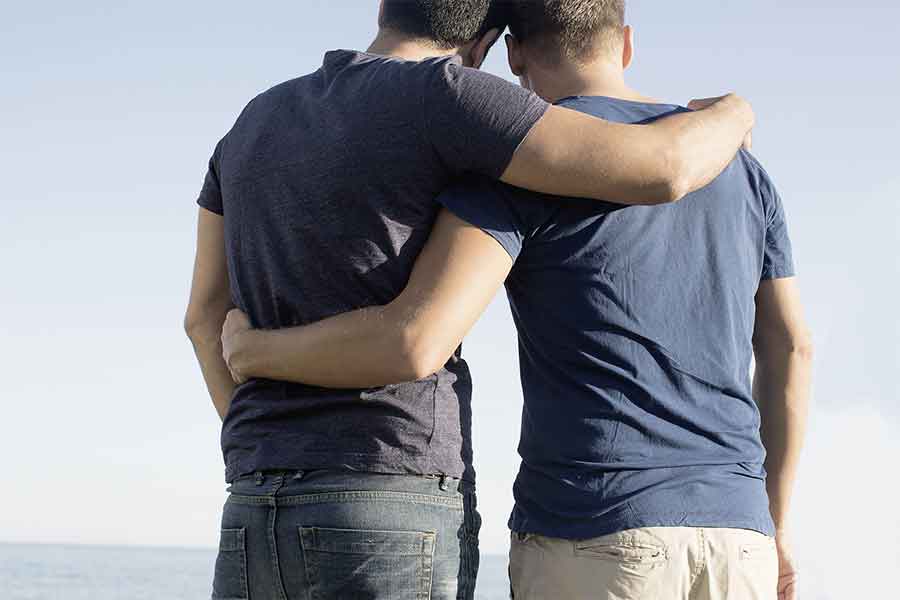
WHAT HAPPENS WHEN GAY MEN LOSE THEIR MOTHERS
RD&T contributing writer, Adam Blum, shares what happens when gay men lose their mothers.
Gay men often have a special relationship with their mothers. Typically, mothers are the first or only person to accept their son’s more “feminine” interests. She might have provided a place for you to develop the real you, rather than the false self that needed to butch it up at school.
Your mother may also be the inspiration for your interest in the domestic arts. Or she may have been the first person to teach you about vulnerability and tenderness.
While it’s certainly not true for all mothers, women, on average, do report lower levels of homophobia than men. Sometimes they can be there for their gay kids in a way that fathers can’t.
What Happens When Gay Men Lose Their Mothers?
Perhaps you sometimes wonder how you will feel when your mother dies.
Here are some insights I can offer based on my own experience of losing my mother a year ago, and what I’ve learned from my clients and friends.
It’s bad, but it gets easier.
The first weeks are the worst. You might find it difficult to concentrate and don’t be surprised if you are strangely tired. Daily tasks that used to be easy can become overwhelming when gay men lose their mothers..
You’ll fall into “if only” thoughts.
Most of us experience thoughts like, “She wouldn’t have died if…” Or, “She would have had a better death if…” Or “I should have…”
The famous grief researcher, Elisabeth Kübler-Ross, named this stage of grief as “Bargaining.” Sometimes it is too hard to accept the truth that death just happens and that we have no control over it. Rather than face that lack of control, we assign reasons or find blame.
You might not cry that much.
I loved my mother deeply, but I didn’t cry a lot. There is no right way to express grief. The only “rule” is that it is helpful to feel the painful feelings rather than to repress them.
Your other relationships may get better.
You may become closer to friends or family who didn’t run away from your grief. You probably will become much more empathic to other people who experience grief.
You might fight more with people close to you.
Everything will irritate and upset you more in those first months of grief. If you find yourself impatient with someone or getting into arguments, it’s a good idea to assume that grief is generating the fight even if it doesn’t seem so on the surface.
You’ve joined a club.
There’s a difference between people who have lost a mother and those who have not. Your friends who have not lost a mother may not understand what you are going through.
It comes and goes.
You feel fine, and then you don’t. And it’s hard to predict your moods.
Mothers are scared.
If you were fortunate enough to be well-mothered then you know that good mothers are especially sacred. It’s joyful to put them on a pedestal. And sometimes, to understand our own lives, we also need to remember that they are regular humans, full of flaws. And some of those flaws had a great impact on us.
There are two grievers within you.
You have the adult you, experiencing the loss of the contact you had with your mother as an adult. But you also have the younger, perhaps more profound experience: you are a little boy who lost his mommy. That younger self will need your compassion and attention.
The grief process takes longer than you think for gay men who lose their mothers.
You’ll want the pain to go away as fast as possible. It takes months to feel like yourself again.
Death gets less scary.
Many months after the loss of your mother, you may realize you got through it, and it no longer causes the same disturbing pain. You survived an important loss and came through the other side. You know—not just intellectually but in your bones—that you can get through loss.
It’s okay to feel relief.
While you feel sadness, you may also feel some relief when your mother dies. That’s normal. Parts of your life may be easier. You may have less obligation. You are no longer going through the worry and uncertainty about her illness.
Eventually, after all the ups and downs, you are left with the feeling of love.
If you loved your mother, that’s what will stay with you when the other feelings settle down.
While our culture is becoming increasingly good about talking about subjects that were once considered taboo, death is something that our society avoids talking about. It’s one event that we are all guaranteed to experience but most of us pretend it doesn’t exist.
Grief is a natural, built-in, healing process. If we don’t get in its way, it will take us on a path to feeling better. We don’t have to “do” anything for it to work.
Sometimes our logical nature tries to stop the grieving process. Intellectual thoughts such as, “I only saw her twice a year so what real difference does it make in my life?” can block our feelings. Unexpressed grief can get us into trouble. The repressed feelings will be expressed but in a less helpful way. If we don’t befriend grief, it’s possible to get stuck in anxiety, depression, loneliness, anger, or addiction.
If we were lucky, our mothers gave us the model of unconditional love, which is perhaps the most healing experience on the planet. The loss of that is impossible to replace. So give yourself a lot of time and space to grieve its loss.
The post What Happens When Gay Men Lose Their Mothers appeared first on Relationship Development and Transformation.
ADAM BLUM
ADAM D. BLUM, MFT, is a licensed psychotherapist and the founder of the Gay Therapy Center. ADAM D. BLUM, MFT, is a licensed psychotherapist and the founder of the Gay Therapy Center, which specializes in relationship and self-esteem issues for LGBTQ people. The center offers services in its San Francisco, New York, Washington D.C., and Los Angeles offices, or by Skype and phone worldwide. Visit its website to subscribe to its e-newsletter and free e-class on building a better relationship with yourself. [https://www.thegaytherapycenter.com/] Follow the Center on Facebook [https://www.facebook.com/Gay-Therapy-Center-148456951864864/] and read its blog. [https://www.thegaytherapycenter.com/gay-therapy-blog/] I received my M.A. in Counseling Psychology from John F. Kennedy University, in 2003. I have a B.A. in Psychology from Vassar College (1984) and I spent my junior year as a Visiting Student in Psychology at Harvard University (1982-83). My work as a couples counselor is influenced by Emotionally Focused Couples Therapy (EFT). I have completed an externship with Sue Johnson, the founder of EFT, and I continue to do advanced training with the International Centre for Excellence in Emotionally Focused Therapy. It is one of the most researched forms of couples counseling and has been proven to be one of the most effective.
Chat Line Categories

Local & Naughty
Free Local & Naughty chatline welcomes your to the ultimate chatline experience!!! Start chatting with

USA Chat Line Hookup
USA’s Sexiest Free Chat Line For Men and Women! Meet local singles in your area


Sexy Live Hookup
Sexy Live Free Hookup is all about fun! This is the quickest route to finally



College Party Line
College Party Lines is a free place where college girls and boys can meet and











